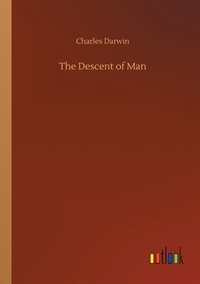Take a photo of a barcode or cover
informative
Not the lightest of reading material, but thoroughly engrossing once you pick up on the subtle threads Darwin exposes. This book should stand equal to On the Origin of Species. Darwin is meticulous in documenting his sources, which makes it hard to read at times as the flow is often broken by these interjections, but his insights into both animal and human behaviour are astounding.
Calling this book the Descent of Man is a little misleading in that 80% of the book is to do with establishing the role of sexual selection before showing how it applies to humans. And it is fascinating. It's more than peacock feathers and bower birds, the role of sexual selection on the development of species is far more dominate than I ever dared imagine.
Whenever you see sexual dimorphism, where the two sexes of a species differ slightly (and not just in extreme examples, it could be subtle differences in height, size, colour, longer teeth, etc), then sexual selection is coming into play. Sexual selection and natural selection go hand in hand. Darwin asks the question, "Why are ravens black?" And it's not because they hunt at night or in the shadows, it is because their mating preferences have steered their colouration.
No doubt some will be offended at Darwin's seemingly sexist remarks on the differences between men and woman, and I'm sure if given the exposure we have in the modern world, Darwin would probably revise some of his comments, but men and women aren't physically equal. And nowhere is this more evident than in the Olympics, where no fuss is made over the sexual segregation of a running race, etc. Why are women physically smaller, more petite and generally paler than men? The answer, surprisingly, is it's not that women are smaller, but that men are bigger. Men are sexually selected by women to be stronger, more robust. Men compete with men for the attention of women, and women are picky, they have too much to lose if they chose the wrong partner, and so this difference has evolved as a result of these choices over thousands of years.
Anyway, jump to the summary of each chapter and to the chapters on the conclusion if you don't want to wade through all the detail, there's some real gems in there.
Calling this book the Descent of Man is a little misleading in that 80% of the book is to do with establishing the role of sexual selection before showing how it applies to humans. And it is fascinating. It's more than peacock feathers and bower birds, the role of sexual selection on the development of species is far more dominate than I ever dared imagine.
Whenever you see sexual dimorphism, where the two sexes of a species differ slightly (and not just in extreme examples, it could be subtle differences in height, size, colour, longer teeth, etc), then sexual selection is coming into play. Sexual selection and natural selection go hand in hand. Darwin asks the question, "Why are ravens black?" And it's not because they hunt at night or in the shadows, it is because their mating preferences have steered their colouration.
No doubt some will be offended at Darwin's seemingly sexist remarks on the differences between men and woman, and I'm sure if given the exposure we have in the modern world, Darwin would probably revise some of his comments, but men and women aren't physically equal. And nowhere is this more evident than in the Olympics, where no fuss is made over the sexual segregation of a running race, etc. Why are women physically smaller, more petite and generally paler than men? The answer, surprisingly, is it's not that women are smaller, but that men are bigger. Men are sexually selected by women to be stronger, more robust. Men compete with men for the attention of women, and women are picky, they have too much to lose if they chose the wrong partner, and so this difference has evolved as a result of these choices over thousands of years.
Anyway, jump to the summary of each chapter and to the chapters on the conclusion if you don't want to wade through all the detail, there's some real gems in there.
adventurous
informative
reflective
medium-paced
5 stars for the part about why/how humans evolved from other species. 1 star for the part that is just scattershot armchair anthropology so embarrassingly laced with culturally conditioned presuppositions Darwin seems to have thought were scientific.
I didn't enjoy this as much as Origin but it was still a good read and provide thorough scientific evidence and analysis for the issues raised. There are some comments within it that would be considered inappropriate today but given the time this was written it is to be expected.
medium-paced
challenging
informative
reflective
slow-paced
challenging
informative
reflective
slow-paced
challenging
informative
reflective
slow-paced





